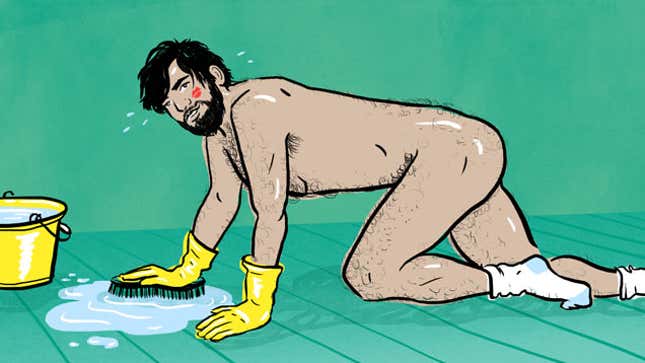If 'Choreplay' Is Real, It Is Also Real Gross
Latest

Choreplay is the idea that you can get a man to do more around the house by gifting him a little ‘tang for his trouble—and I don’t mean the juice product beloved by astronauts. Let me be clear: no matter if this idea is effective, it’s nonetheless pretty gross.
Because I grew up with all women my entire life, I grew up thinking we just had to do all the chores that needed to be done around the house. No one promised me a rich husband or a lot of orgasms for knowing how to mop or organize some Tupperware. So, later on, when I went to college and met men and saw how they lived and noticed that they were often inside-chore-avoidant, I was like, hey, what’s this all about? How come you don’t understand how to like, wipe off counters and shit? And they were like, I dunno, I just don’t think about it/didn’t even notice/why does it matter/that’s dumb shit.
And then I was like, ha, no, seriously, if everyone says men are like so much smarter than women, how come you don’t know how to do this real dumb stuff that’s like, so obvious/easy that even women can do it? Like there’s a moldy piece of pizza right there on the counter, like how come you don’t see it? And then they would act like I was kind of a bitch.
Later on, thanks to wimmin’s studies, I would come to understand that this is partly because our society devalues the work that women tend to do, deeming it too menial for men to be bothered with. Chore-avoidance is also because of learned helplessness, a real thing people do every day to fake like they don’t understand how something works or can’t do it as well as you in order to get out of having to do it at all. It’s also because of simple socialization: some men just weren’t required to do chores growing up, or have some unexamined bias or expectation that a wife does this stuff, so they don’t see why they should.
Both things result in the same situation: Women do more and are still very pissed about it.
We’ve written here frequently about the fact that men still do less housework than women and what to do about it. Unfortunately, in many relationships, this is one of those issues that requires ongoing discussion and negotiation, and depends on the first place on an understanding of how essential it is, in most modern situations, to share this work.
But still, in so many chore conversations, we seem to still hit on a tired old stereotype about incentivizing cleaning for men. If you would just clean more, we say, your wife will think it’s sexy and repay you with a bulk coupon set for unlimited hot BJs 4 life.
This comes up in an op-ed from Sheryl Sandberg and Adam Grant at the NYT called “How Men Can Succeed in the Boardroom and the Bedroom.” Previously, the duo had lamented the fact that women do more office housework; in this one, they continue to tackle corporate inequality by showing men how it benefits them economically to think of women as fully human.
They write:
-

-

-

-

-

-

-

-

-

-

-

-

-

-

-

-

-

-

-

-

-

-

-

-

-

-

-

-

-

-

-

-

-

-

-

-

-

-

-

-








































